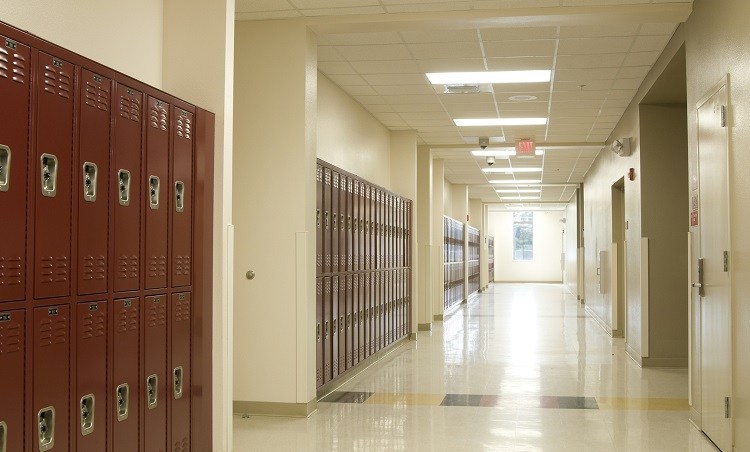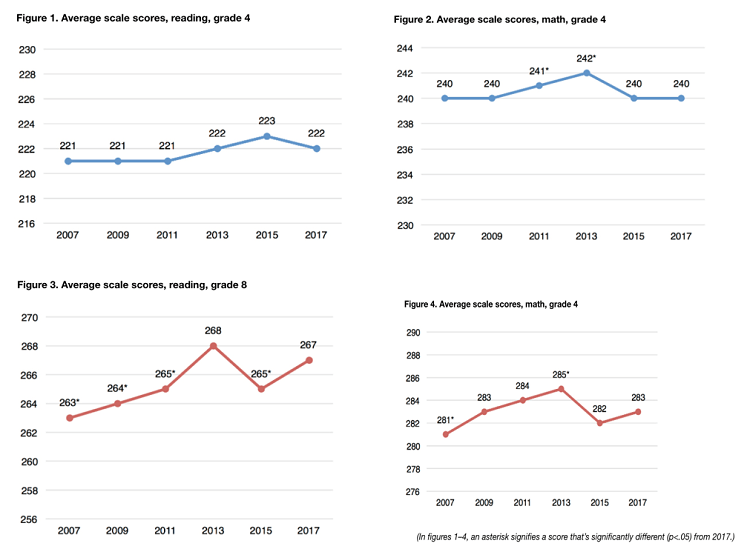NAEP scores tell us something, but not everything

The 2017 results for the National Assessment of Educational Progress, better known as NAEP, were published yesterday, and Mississippi has been one of the few states touted as a “winner” in this round of testing.
While there is reason to celebrate, this narrative needs some rounding out. NAEP score gains are preferable to losses, but just a few years ago in 2015, 57 percent of Mississippians rated public schools a C, D, or F. Public school enrollment has been declining for years. And Mississippi remains behind most other states on NAEP assessments, even with laudable gains.
Mississippians certainly can’t sit back and relax. We also can’t assume that current policies offer the best way forward. As conversations about NAEP continue, here is what you need to know.
2017 NAEP results
While the state’s scores only increased slightly in 8th grade reading between 2015 and 2017, over the past 10 years, the state’s scores have increased across the board. The Mississippi Department of Education released the following statistics:
Mississippi NAEP highlights 2007-2017
- Mississippi is 4th in the nation for gains in 4th grade math;
- Mississippi is 7th in the nation for gains in 8th grade math;
- Mississippi is 2nd in the nation for gains in 4th grade reading; and
- Mississippi is 12th in the nation for gains in 8th grade reading.
The test assesses 4th and 8th grade reading and math skills and is administered across the nation every two years. NAEP scores nationally are stagnant or declining (see below), so state and national leaders are praising Mississippi as a beacon of hope in dismal times.

A well-rounded view
Mississippi’s gains are notable, but we should keep in mind where we’re starting: the bottom. In the words of the Nation’s Report Card, Mississippi has performed “significantly lower” than the national public average in math and reading in the past decade.
During the same years, Mississippi has seen declining public school enrollment, fewer people entering the teaching profession, and the explosion of standardized testing in schools.
More importantly, from 2007 to 2017, eleven classes graduated and many students completed almost an entire K-12 career.
Instead of being content with incremental improvements as student after student graduates, Mississippi should consider ways to progress much faster. Here is some food for thought:
- One way to improve academic performance in public schools is to build private school choice programs. Research shows public schools near private school choice programs have better academic outcomes, as they experience the benefits of parents being able to choose the best fit for their children and the motivation of a competitive environment. Mississippi has two private school choice programs for students with special needs, but the Legislature refused to expand the ESA program in the last session.
- Large charter sectors in states like Arizona, Colorado, and Florida gave traditional public schools a run for their money in the latest NAEP assessment. The hundreds of charter schools in these states out-performed their traditional counterparts in math and reading, even garnering higher marks than top-performing Massachusetts schools on some tests. Meanwhile, Mississippi’s charter sector is growing at a glacial pace, averaging one school approved for each year the law has been in place.
- A growing body of research demonstrates that higher standardized test scores are not consistently linked with better long-term outcomes, such as high school graduation, college acceptance and graduation, a good job, and staying out of prison. These are the things parents care about, not test scores. Why not focus more, then, on parent satisfaction? The vast majority of Mississippians want more choice and the state as a whole can benefit from the buy-in that comes along with that.
- In our own listening tour throughout the state, the students, teachers, and education leaders have agreed: we test too much. Instead of playing the diagnostic role they are better suited to, tests have become prescriptive and consume the entire curriculum and school day. We are in danger of creating generations of students who test well…and nothing more. NAEP scores provide a helpful snapshot, but let’s not give them (or any test) too much credit.
When you hear that NAEP scores prove Mississippi is “moving in the right direction,” look at the bigger picture. We are spending more than ever and heavily regulating schools from the top-down…for what? Small gains over the course of a decade?
Mississippi must take a more dramatic, more thoughtful approach to improving the education of students today…not ten years from now. And the ultimate goal should be happier, more knowledgeable, more productive citizens, not better test scores.